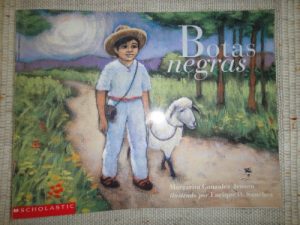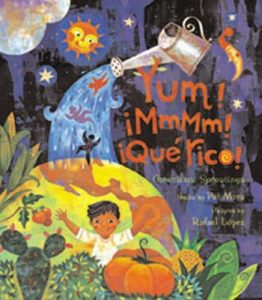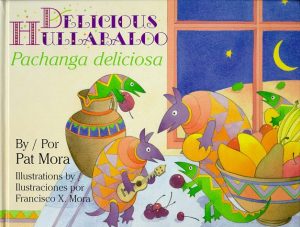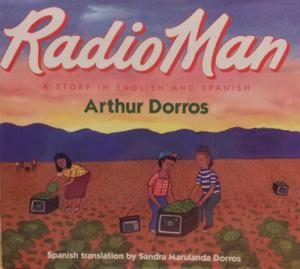 As he travels with his family of migrant farmworkers, Diego relies on his radio to provide him with companionship and help connect him to all the different places in which he lives.
As he travels with his family of migrant farmworkers, Diego relies on his radio to provide him with companionship and help connect him to all the different places in which he lives.
Spanish
Botas Negras
Gracias, Rosa
Family Pictures, 15th Anniversary Edition / Cuadros De Familia, Edición Quinceañera
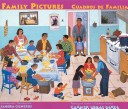
Family Pictures is the story of Carmen Lomas Garza\’s girlhood: celebrating birthdays, making tamales, finding a hammerhead shark on the beach, picking cactus, going to a fair in Mexico, and confiding to her sister her dreams of becoming an artist. These day-to-day experiences are told through fourteen vignettes of art and a descriptive narrative, each focusing on a different aspect of traditional Mexican American culture. The English-Spanish text and vivid illustrations reflect the author\’s strong sense of family and community. For Mexican Americans, Carmen Lomas Garza offers a book that reflects their lives and traditions. For others, this work offers insights into a beautifully rich community.
See the review at WOW Review, Volume 3, Issue 2
The Dream on Blanca’s Wall/El Sueno Pegado En La Pared De Blanca: Poems in English and Spanish/Poemas En Ingles Y Espanol
Offers a collection of poems in English and Spanish that tell of a young Mexican-American girl’s dream to overcome her family difficulties and economic hardships in order for her to achieve her goal of becoming a teacher.
Yum! Mmmm! Que Rico!: America’s Sproutings
Abuelos
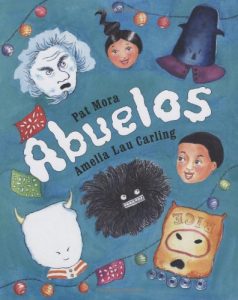 The tradition of los abuelos comes from northern New Mexico. In the cold months of midwinter, village men disappear to disguise themselves as scary old men and then descend on the children, teasing them and asking if they’ve been good. The abuelos encourage the little ones to dance and sing around huge bonfires. Afterwards, everyone enjoys cookies and empanadas. In this charming book, young Ray and Amelia move to a new village and experience the fright and fun of los abuelos for the first time. Amelia Lau Carling researched the region for her vibrant artwork, and author Pat Mora’s lively text captures the appeal of an old-world celebration now being revived.
The tradition of los abuelos comes from northern New Mexico. In the cold months of midwinter, village men disappear to disguise themselves as scary old men and then descend on the children, teasing them and asking if they’ve been good. The abuelos encourage the little ones to dance and sing around huge bonfires. Afterwards, everyone enjoys cookies and empanadas. In this charming book, young Ray and Amelia move to a new village and experience the fright and fun of los abuelos for the first time. Amelia Lau Carling researched the region for her vibrant artwork, and author Pat Mora’s lively text captures the appeal of an old-world celebration now being revived.
Delicious Hullabaloo/Pachanga Deliciosa
Los Gatos Black On Halloween
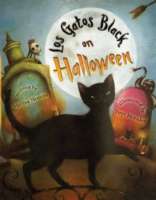
Follow los monstruos and los esqueletos to the Halloween party Under October’s luna, full and bright, the monsters are throwing a ball in the Haunted Hall. Las brujas come on their broomsticks. Los muertos rise from their coffins to join in the fun. Los esqueletos rattle their bones as they dance through the door. And the scariest creatures of all aren’t even there yet!This lively bilingual Halloween poem introduces young readers to a spooky array of Spanish words that will open their ojos to the chilling delights of the season.
Rin, Rin, Rin / Do, Re, Mi
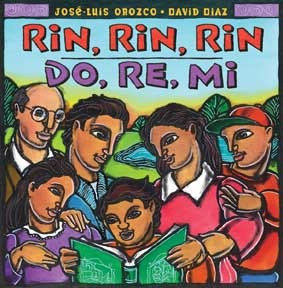 Written in both Spanish and English, a young child asks his parents to “sing to me, say letters to me, rhyme with me, count with me, read with me.” Like Read To Your Bunny, Rin, Rin, Rin/Do, Re, Mi is a book that has two purposes–as a fun picture book and as advice for parents who want to give their children a foundation in literacy. This book features lyrics and music by Jose-Luis Orozco, a beloved performer among Latino communities, as well as wonderful artwork by Caldecott artist David Diaz.
Written in both Spanish and English, a young child asks his parents to “sing to me, say letters to me, rhyme with me, count with me, read with me.” Like Read To Your Bunny, Rin, Rin, Rin/Do, Re, Mi is a book that has two purposes–as a fun picture book and as advice for parents who want to give their children a foundation in literacy. This book features lyrics and music by Jose-Luis Orozco, a beloved performer among Latino communities, as well as wonderful artwork by Caldecott artist David Diaz.

